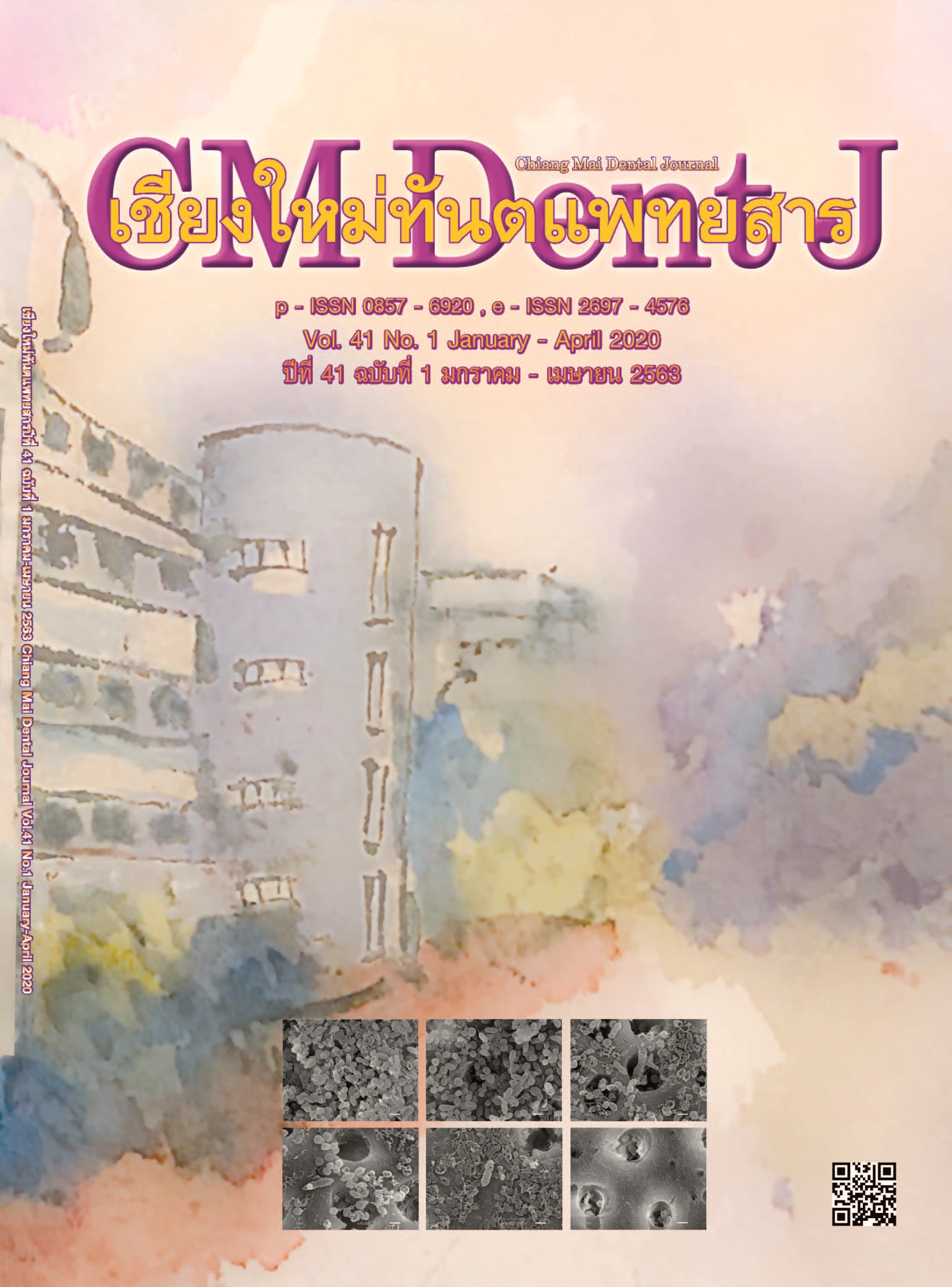Achievement of Problem-based Research Methodology Learning in Short-course Workshop for Oral and Maxillofacial Surgery Residents
Main Article Content
Abstract
The problem-based research methodology learning (PBRML) is a novel research methodology course using problem-based learning concept. PBRML course in the master degree studying of Bangkokthonburi University (BTU) could improve the research competency, so it was modified for short-course workshop for residents in oral and maxillofacial surgery. The objective of the study was to determine an achievement of PBRML in short-course setting. The four-day short-course workshop of PBRML was implemented in January, 2018. The first-year residents in oral and maxillofacial surgery enrolled in this study had 6-month training experience before attending the workshop. Pre-test and post-test were performed in each resident (n=21). Total scores and the scores in knowledge and application domains were compared using paired t-test. For the results, mean of the total pre-test scores was 36.3±12.9 (out of 100), statistically different from those of the post-test scores (77.6±11.1). In the knowledge domain, pre-test score (33.3±11.1) was statistically different from post-test score (77.8±11.4). In the application domain, pre-test score (39.3±17.5) was statistically different from post-test score (77.4±13.8). In previous study conducted in five-week module, the post-test scores in the knowledge and application domains were 89.0±13.0 and 94.6±18.1 respectively, which differed from the scores of this study. Achievements of problem-based research methodology learning in knowledge and application domains were favorable. However, the mean scores of this class were lower than those of our previous study in five-week module.
Article Details
References
Royal College of Dental Surgeons. The announcement about guideline to perform research for resident, 2018. Available from: HYPERLINK “https://www.royalthaident.org/files/course/research/20180305/ประกาศราชวิทยาลัยเรื่องการทำงานวิจัย_2561.pdf. [cited Jan 6, 2019]” https://www.royalthaident.org/files/course/research/20180305/ประกาศราชวิทยาลัยเรื่องการทำงานวิจัย_2561.pdf. [cited Jan 6, 2019]
Maastricht University. Problem-Based Learning. [cited May 2, 2019] Available from: HYPERLINK “https://www.maastrichtuniversity.nl/education/why-um/problem-based-learning.”https://www.maastrichtuniversity.nl/education/why-um/problem-based-learning.
Grigg R, Lewis H. Moving the andragogy of teacher educators forward: the potential and challenges of Problem-Based Learning in teacher education. J Problem-Based Learning 2018; 5: 5-20.
Kumchai T, Kumchai H, Suzuki EY, Pratumwong K. Achievement of problem-based research methodology learning in postgraduate level. Thai J Oral Maxillofac Surg 2017; 31: 100-106.
Barrows HS. Problem-based learning in medicine and beyond: a brief overview. New Directions Teach Learn 1996; 68: 3-12.
Wood D. ABC of learning and teaching in medicine. Br Med J 2003; 326: 328-330.
Chantravekin Y. Learning accomplishment for oral and maxillofacial surgery courses of Thammasat University Dental Students. J Dent Assoc Thai 2006; 56: 97-106.
Schmidt HG, Loyens SMM, Van Gog T, Paas F. Problem-based learning is compatible with human cognitive architecture: commentary on Kirschner, Sweller, and Clark (2006). Educ Psychologist 2007; 42: 91–97.
Chantravekin, Y. Learning accomplishment for oral surgery: integrated vs. separated courses. Proceedings of the 86th General Session and Exhibition of International Association for Dental Research Meeting (IADR). 2-5 July 2008, Toronto, Canada.
Wells SH, Warelow PJ, Jackson KL. Problem based learning (PBL): a conundrum. Contemp Nurse 2009; 33: 191-201.
Barrett T. The problem-based learning process as finding and being in flow. Innovat Educ Teach Int 2010; 47: 165-174.
Hung W. Theory to reality: A few issues in implementing problem-based learning. Educ Tech Res Dev 2011; 59: 529–552.
Schmidt HG, Rotgans JI, Yew EHJ. The process of problem-based learning: What works and why. Med Educ 2011; 45: 792–806.
Yew EHJ, Schmidt HG. What students learn in problem-based learning: A process analysis. Instruct Sci 2011; 40: 371–395.
Doody J. An evaluation of the effectiveness of using a hybrid PBL approach in the teaching of the Java programming language to first year third level. Proceedings of Higher Education in Transformation Conference. June 2015, Dublin, Ireland.
Newman MJ. Problem based learning: an introduction and overview of the key factors of the approach. J Vet Med Educ 2005; 32: 12-20.
Donnelly R. Using problem-based learning to explore qualitative research. Eur Educ Res J 2003; 2: 309-321.
Ellis TJ, Levy Y. Framework of problem-based research: a guide for novice researchers on the development of a research-worthy problem. Informing Sci Int J Emerg Transdiscipline 2008; 11: 18-33.
Zheng A, Zhou Y. An inductive, interactive and adaptive hybrid problem-based learning methodology: application to statistics. J Engineer Sci Tech 2011; 6: 639-650.
Chilkoti G, Mohta M, Wadhwa R, Saxena AK, Sharma CS, Shankar N. Students’ satisfaction to hybrid problem-based learning format for basic life support/advanced cardiac life support teaching. Indian J Anaesth 2016; 60: 821–826.
Emerald NM, Aung PP, Han TZ, et al. Student's perceptions of problem-based learning conducted in Phase 1 Medical Program, UCSI University, Malaysia. South East Asian J Med Educ 2013; 7: 45-48.


